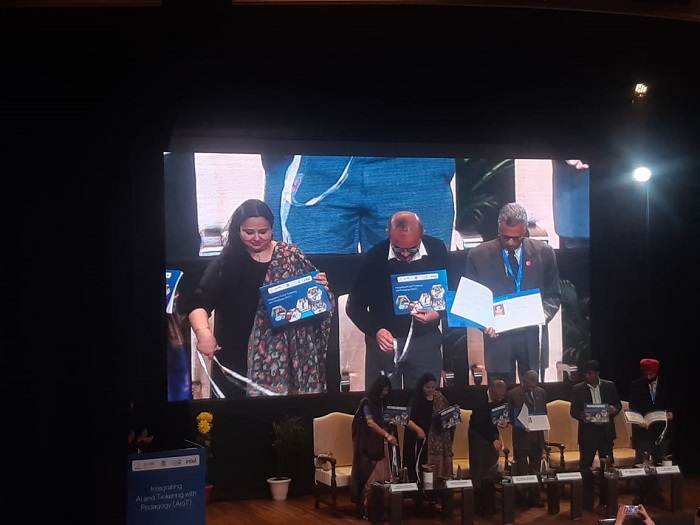CBSE teacher workshop on NEP 2020
"The purpose of education is to make good human beings with skill and expertise." Dr. A. P. J. Abdul Kalam.
In collaboration with the Atal Innovation Mission - NITI Aayog and Intel India, CBSE organised an informative session to enable the teachers to get oriented with the new education policy - NEP 2020 at the Dr Ambedkar International Centre on 24 January 2023. The event aimed to demonstrate AIoT integration-based projects and ideas in pedagogy.
Ms Simranjeet Kaur of our School computer science department participated in the event. Approximately 500 educators from across the nation marked their presence at the event.
[gallery link="file" order="DESC"]
Ms Shweta Khurana, Sr. Director APJ - Government Partnerships & Initiatives, Global Government Affairs Group, Intel, commenced the session by appreciating the teachers and congratulating them for creating AI integrated curriculum. She elucidated the importance of tech-enabled education to impart relevant skill sets. The speaker focussed on the significance of synergising ATL Tinkering Labs and AI for better learning outcomes. She explained how AI has become one of the five superpowers and should be used responsibly. She elucidated that, to maintain national competitiveness, educators and learners must know how to navigate in the era of emerging technologies.
Dr Biswajit Saha, Director (Training & Skill Education- CBSE) and Ms Deepali Upadhyay, Programme Director(AIM), NITI Aayog, emphasised the importance of technology integration in teaching and learning to impart 21st-century skills and how the AI integrated curriculum would help in maximising the use of tinkering labs in the classroom.
Dr C Murlikrishna shared his experience of creating ATL labs and focussed on making every child a ' tinkerer'.He also said that initiatives of these kinds will help improve our country's ranking on the Global Innovation Index.
Chief Guest, Dr Chintan Vaishnav, Mission Director, Atal Innovation Mission, NITI Aayog, shared his invaluable experience with the eager audience. He discussed the role of pedagogy in producing different learning outcomes and how multiple ways with multiple modes strengthen the understanding of the concept. Furthermore, Dr Vaishnav explained how the use of curricular activities and integration of AI in the classroom contribute to a paradigm shift from rote learning to experiential learning. He also elaborated on the role of teamwork in the teaching-learning process.
The attendees were accorded an opportunity to look at the intriguing displays that included several AIoT integration-based lesson plans created by teachers and AIoT-enabled projects on the social impact made by students. The lesson plans focussed on real-time problems in different subjects and their solutions by the students using Tinkering and AI integration. For example, an AI-integrated model, under the social sciences class VIII curriculum, predicted the air quality for solving the problem of respiratory diseases. Another exhibit identified the difference in temperatures in different areas.
The students of class VI demonstrated a project to detect the correct body posture. Many more projects, like an infant monitoring system, detecting and preventing milk spoilage, predicting soil quality for plant growth and health, waste management, etc., were also displayed. The implementation of the projects was done using Arduino and multiple sensors.
A compendium with 70 exemplar lesson plans was released to motivate the use of AI and Tinkering in classroom teaching and learning.
Mr R.P. Singh, Joint Secretary (Skill Education-CBSE), proposed the vote of thanks.
Altogether, it was an illuminating session that focussed on integrating technology and tinkering in the teaching-learning process to create a generation of 'future-ready' pupils.













